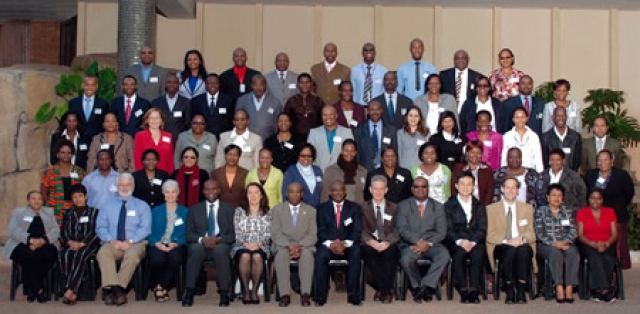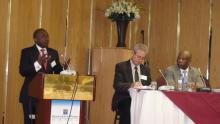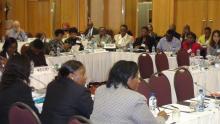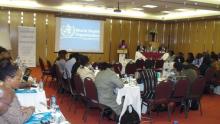Regional Consultation on Cervical Cancer Prevention and Control gets underway
 Pretoria, 28 May 2012 -- More than 200 million women aged 15 years or older are at risk of developing cervical cancer in the African Region. Annually 71,000 cases are diagnosed, resulting in 62,000 deaths. To stem this rising tide of cervical cancer, the World Health Organization (WHO) has today begun a three-day regional consultation on cervical cancer prevention and control in Pretoria, South Africa.
Pretoria, 28 May 2012 -- More than 200 million women aged 15 years or older are at risk of developing cervical cancer in the African Region. Annually 71,000 cases are diagnosed, resulting in 62,000 deaths. To stem this rising tide of cervical cancer, the World Health Organization (WHO) has today begun a three-day regional consultation on cervical cancer prevention and control in Pretoria, South Africa.
The meeting is attended by over 80 participants from 18 countries comprising public health experts, development partners and WHO staff.
Participants will discuss a range of issues including current WHO recommendations and best practices in addressing cervical cancer in the Region, progress in establishing cervical cancer control programmes in respective countries as well as costing of national comprehensive cancer control programmes.
Welcoming the delegates, Dr Augustine Ntilivamundla, National Professional Officer (WHO-South Africa), who spoke on behalf of Dr Francis Kasolo, the Acting WHO Representative to South Africa, noted that cervical cancer is the second most common cancer in women worldwide with 85% of deaths occurring in developing countries.
He said:" The WHO in the African region is advocating for urgent action to reduce the high burden of cervical cancer in Africa. A comprehensive approach is being proposed to cancer prevention and control that encompasses not only prevention with vaccines but also screening, management of precancerous lesions and treatment of invasive cancer and proper palliative care".
In the opening remarks delivered on behalf of Dr Aaron Motsoaledi, the South African Health Minister, Professor Melvyn Freeman, Head of the Non Communicable Diseases (NCDs) Cluster of the Ministry of Health, South Africa, told participants that the United Nations General Assembly Political Declaration on Non-communicable diseases as well as the Brazzaville Declaration on Non-communicable diseases have injected momentum in addressing NCDs particularly chronic respiratory diseases, cancer, diabetes and cardiovascular diseases.
He called for an integrated approach in addressing NCDs by applying some prevention strategies that have been successful in tackling communicable diseases. "We are moving forward in prevention of cancers but have to do it in ways that are cost effective. Let us not get caught in restrictive silos," he emphasized.
Referring to other challenges that need to be addressed, he said: "It is amazing that we now have a vaccine that can deal with HPV. Science has been progressive in coming up with a clinical intervention. But we also have health systems and finance issues that are critical implementation concerns". Professor Freeman urged participants to identify ways of tackling these issues in their discussions.
The consultation involves plenary sessions, case studies and a Partners round table.
___________________________________________________________________
For more information, please contact:
Dr Richard Mihigo + 472 413 9926 E-mail: Mihigor [at] afro.who.int (Mihigor[at]afro[dot]who[dot]int).
Dr Jean-Marie Dangou + 472 4139 E-mail: Dangoujm [at] afro.who.int (Dangoujm[at]afro[dot]who[dot]int)
Collins Boakye-Agyemang + 472413 9420 E-mail: Boakyec [at] afro.who.int (Boakyec[at]afro[dot]who[dot]int)





